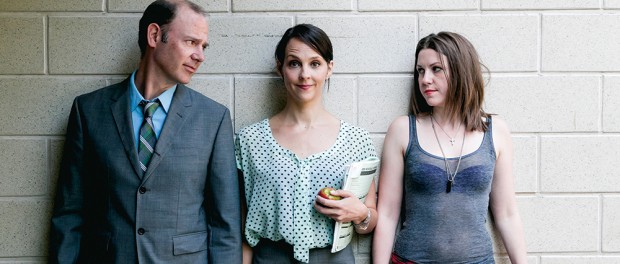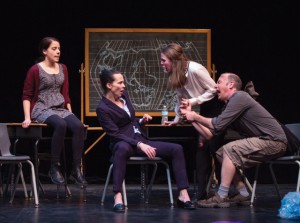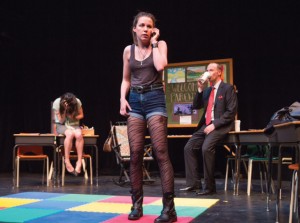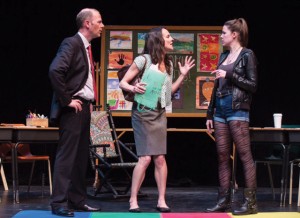Staging a defence of public education
George F. Walker: Playwright

I dragged my mother to see two plays by George F. Walker in his six play series called “The Classroom Plays” this past Mothers’ Day. A retired elementary school teacher, she was not thrilled to be hauled along to see plays set in the elementary context. In her prime, during the seventies and eighties, she was an active member of the Federation of Women Teachers’ Association of Ontario (FWTAO). Her generation fought for prep time, maternity benefits and the right to wear pants to work. She reminded me, “Nanci, you were one of the first babies born to a teacher receiving six weeks of maternity leave in 1971. Back then, girls who got engaged didn’t wear their rings to work because they were afraid principals would pressure them to quit. One of my friends got sent home because she wore a skort instead of a skirt to work. Nobody complained when we wore mini-skirts, but when we fought to wear trousers on yard duty there were issues. There was rampant chauvinism.”
Mom retired with the first of the “85 factors” after suffering the slings and arrows of the Harris-Snowblen regime. Twenty years later she was in Walker’s audience. The plays, The Big Issue and Parents’ Night, were authentic, ironic and powerful, but mom was still not over the psycho-social pummelling that teachers had sustained in the nineties. While she laughed at the realism, even fist pumping when the administrator admitted to being afraid of returning to the classroom, it was also a painful reminder to her of how demoralizing her profession was at the end.
Curious to understand why Walker chose education as a topic and how he was able to vividly capture the ironies of teaching, I interviewed the Canadian playwright in July. While he is not a teacher, he has had three daughters who went through Ontario’s public education system and a wife who taught music for the Royal Conservatory, Seneca College and daycare. Education is a big deal in their home. After countless discussions bordering on rants, it was his daughter who finally said, “Why don’t you write about it, Dad?” When I asked him about his choice of education as a topic, he said, “I am worried about teachers in this society, how little they are respected and the pressure they are under. Teachers are marginalized and misunderstood, while parents are nasty. I have empathy for teachers and I am sympathetic because this societal shift against teachers makes them less assured. The more teachers get piled on, the more sympathy I have for them. They are an easy target for a lot of people, particularly parents and politicians. No one knows how hard the job is unless they do it.”

 Walker’s plays are effective because they capture human behaviour within the current system. The plays are not about the classroom, but about the relationship between the stakeholders: parents, teachers, principals, unions, and the government. This is why they resonate with education workers. The details are honest and the conversations, experiences and ideas all authentic. Of course there are theatrical flourishes, but Walker taps into the mutual distrust between stakeholders who, under different circumstances, could be naturally allied. “Parents don’t know what’s going on. They’re ignorant. There might be things wrong with the system that parents and teachers could work together to address. I’ve heard from many teachers that their hands are tied due to board guidelines, school policies and legislation. They have very little authority. When my kids were going through the system in Toronto we rarely had a year without political strife, but because we had a teacher in the house we knew what they were dealing with and that it wasn’t about wanting more money.”
Walker’s plays are effective because they capture human behaviour within the current system. The plays are not about the classroom, but about the relationship between the stakeholders: parents, teachers, principals, unions, and the government. This is why they resonate with education workers. The details are honest and the conversations, experiences and ideas all authentic. Of course there are theatrical flourishes, but Walker taps into the mutual distrust between stakeholders who, under different circumstances, could be naturally allied. “Parents don’t know what’s going on. They’re ignorant. There might be things wrong with the system that parents and teachers could work together to address. I’ve heard from many teachers that their hands are tied due to board guidelines, school policies and legislation. They have very little authority. When my kids were going through the system in Toronto we rarely had a year without political strife, but because we had a teacher in the house we knew what they were dealing with and that it wasn’t about wanting more money.”
Walker has received tremendous support from educators lauding his plays. Typically they say that they know the parent, principal or colleague represented by the characters. “It’s like having an audience inside the audience because the teachers give a more intense response. It’s cathartic and healing because their voice is not often heard. In my plays I just let the conflict happen and then we hear teachers in the audience explode. The characters are saying things that teachers would never dare say even if they wanted to. To hear those ideas expressed is affirming for them.”

Walker loves that teachers are coming, but he feels that it is the people that don’t know how the system works that should be attending. You see, he is more interested in life than theatre: “If teachers find this accurate, then parents should come and see it and ask questions about how to fix the issues. The easiest thing to do is whine about your kids’ teachers, but parents should be trying to figure out what’s really going on. Also, teachers are human beings and it is tremendously hard to be in that class, prepare lessons, mark assignments and deal with behaviour. My daughter mostly remembers teachers having to deal with behaviour issues and how difficult it was for them to teach and parent at the same time. The parenting should be taking place at home, but in reality it is yet another aspect of a teacher’s job. People don’t seem to understand that.” As I listen to Walker, I am reminded of a superintendent getting lambasted in the media a few years ago for suggesting that teachers “co-parent.”
Initially Walker sounds like he is pointing fingers at parents; however, he is empathic to everyone. All his characters are in a complex set of circumstances where they are vulnerable, fragile and very close to losing it. Remember, this is theatre. The conflict is heightened in order to engage us. Walker explains that parents and teachers are an excellent catalyst for drama because teachers have to be restrained and often parents are not: “Once you get past the formalities there is inherent conflict and it is intense.” Ideally, he wants both sides to talk without blaming. When asked how to repair this, Walker posits, “perhaps we need to get back to trust and maybe the way we do that is to localize decision making. Once teachers have more say, they can own the decisions and the outcome.”

As we talk, Walker returns to the compensation issue and society’s expectations: “Teachers are educators not social scientists. They are not there to experiment with social and behavioural issues. If we are going to ask them to take that behavioural stuff on, that is yet another argument to pay them more. I think I would like to see teachers and principals have more control over what and how to teach with an emphasis on creativity not board and governmental control. Studies coming out of OISE, while well intentioned, are often experimental. Our children are not guinea pigs and teachers are not behavioural scientists.” Walker thinks a starting point would be to place decision-making control in the schools and classrooms. “Give teachers more control and pay them more. This is about money because that’s what society values. If we pay them more, their status goes up. They should be revered and respected like doctors or lawyers. Teachers should be at the top of that list. My parents didn’t blame teachers if something went wrong with one of us, but unfortunately some politicians are looking to make a name for themselves by trying to bust unions. In doing so, they are making it permissible to blame teachers
for everything.”
Walker wants us to think about what teachers do: “Most of them are pretty good, some are outstanding and then you come across a rare bad one. When I think back, I think about the ones that changed my life. Teachers do that. You learn things about yourself. They encourage you. Parents don’t realize how complex the classroom is with diverse cultures, religions and backgrounds. We are asking teachers to foster growth, to teach our kids to be good citizens. The more complex society gets, which seems to increase daily, the more complex the classroom gets. More money needs to go into education.”

Walker doesn’t have an issue paying more taxes to fund public education to the level it needs in order to effectively address these dynamics. He feels that politicians need to stand up and say we need more taxes, but this is problematic if governments continue to mismanage finances. For a political party to outright ask for more money, they need to have the credibility to say that they will be prudent fiscal managers. In the wake of gas plant and senate expenditure scandals the integrity of oversight is undermined. However, Walker believes that if we are going to provide the opportunities to develop our children for the future, this is a conversation that needs to happen. For his part, Walker concedes that he needs to get more non-teachers attending his plays. “I want to help. Perhaps we need to tour the show. It’s a cheap show to mount, but the cast was pretty exhausted by the end of those two plays. I suppose it is time to talk about touring the plays. “
As for the outstanding four plays to be written, Walker is planning to cover secondary and community college contexts. Without missing a beat, Walker starts talking about the inequity of support staff compensation. He explains that Early Childhood Educators (ECE) receive different training than teachers, but they both work in the same classroom. There is inequality and misunderstanding of what the jobs are and he feels ECEs are grossly underpaid for the work they do. He believes more opportunities for collaboration would help break down the tensions in these circumstances. Walker explains that he believes support staff, like teachers, are underpaid because historically it was women’s work and therefore not respected. While he concedes that this is changing, at the root is sexism. Also, people just do not pay attention to and value different skill sets. Walker laughs, “I did a series about the regional court system. We learned quickly that if you went to a law firm and they didn’t have secretaries nothing would get done!”

As we were wrapping up the interview, I asked Walker what else could be done to address negative attitudes toward teachers and education workers. He responded, “I think union leaders need to better feature the difficult aspects of what their members do, publically, whether in bargaining or in between rounds. Talking money and hours is important, but people just don’t think about the important things much. The importance of what you do needs to be a big part of the message to the public.
Reflecting upon Walker’s observations, as well as my mom’s, I couldn’t help but wonder if each generation was like a new scene in Bill Murray’s movie Groundhog Day. The pragmatic idealist in me has to believe that the public will eventually understand, but my inner activist voice says, “if not now then when?”
Note: The double bill of Parents Night and The Bigger Issue premiered at Theatre Passe Muraille in Toronto in April and May. Both plays were produced by the CrazyLady production company. For more information about the playwright, George F. Walker or his work, visit www.crazylady.info.

so very insightful regarding the current issues. The perspective of your Mother’s era is very enlightening – I am from her era. I retired a year early due to top down absurd demands and lack of support from parents. I cried for months missing the students and drama classes but NOT the external destructive “crap” from admin and parents and flavour of the day initiatives implemented without thought or training :(. Walker has given front line educators a tool to advocate and enlighten -so excellent that you used it. The interview was exceptionally well done. Best of luck teaching in neo liberal post modern times. Believe that when you speak up you can make a difference don’t stop !!!!!!